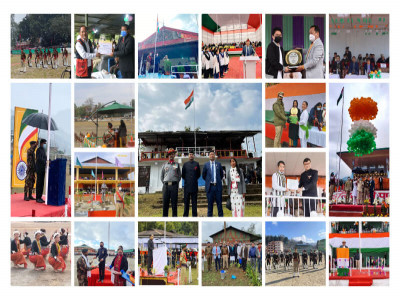
Birsa Munda: A Visionary Leader of Tribal Resistance
Birsa Munda, born in 1875 in Ulihatu, Bihar (now in Jharkhand), India, was the
son of a Munda tribal leader, Sugna Munda. Growing up in the Chotanagpur
plateau, Birsa witnessed the hardships faced by his community under British
colonial rule.
The Mundas were primarily engaged in agriculture, practicing shifting cultivation, and cultivating crops such as rice, pulses, and millets.Apart from agriculture, the Mundas were skilled in activities like hunting and gathering. They had a rich cultural heritage with traditional songs, dances, and rituals that were integral to their way of life. The Munda community had a decentralized social structure, organized into clans or "kilis," each headed by a chief.
Birsa's early life was marked by the socio-economic injustices prevalent in tribal areas. The Munda community, like many other indigenous groups, suffered from exploitation, displacement, and discrimination under the British regime. These early experiences deeply influenced Birsa and fuelled his resolve to fight for the rights and well-being of his people.Birsa led the Munda Rebellion (also known as the Ulgulan), a significant tribal uprising against the British in the late 19th century. His leadership inspired a united front among various tribal communities, challenging the oppressive policies of the colonial government.
Birsa Munda's opposition to the British stemmed from the oppressive policies imposed on his community, the Munda tribe. The introduction of Forest Laws, non-tribal settlers, and other colonial measures adversely affected the traditional lifestyle, livelihoods, and autonomy of the Mundas.The Munda Rebellion, led by Birsa, was a significant tribal uprising against British rule. It took place between 1899 and 1900 in the Chotanagpur plateau. The rebellion was not only a response to economic exploitation but also a resistance against cultural and religious changes imposed by the British.In 1900, Birsa Munda was arrested by the British authorities. He died in British custody under mysterious circumstances, leading to speculation about the circumstances of his death. Some believe he succumbed to illness, while others contend that he was mistreated or even killed while in captivity.
Cultural and Religious Resistance
Birsa's leadership extended beyond the political realm. He founded the religious movement called "Birsait," which aimed at revitalizing the Munda society and fostering a sense of unity among the tribes. His teachings emphasized a monotheistic belief system and a rejection of external influences.
The rebellion was not only a resistance against British rule but also a response to the cultural and economic changes imposed on the Munda community. Birsa Munda's leadership sought to protect the traditional ways of life and the autonomy of the Munda tribe in the face of external pressures.
Birsa Munda's birth anniversary, is celebrated as 'Birsa Jayanti,' to remember and honor his sacrifice and dedication to the tribal cause. Tributes are paid across the country, especially in Jharkhand, where his life and struggle are commemorated through various cultural events and programs.
Disclaimer: The opinions expressed in this article are those of the author's. They do not purport to reflect the opinions or views of The Critical Script or its editor.

Newsletter!!!
Subscribe to our weekly Newsletter and stay tuned.

















Related Comments